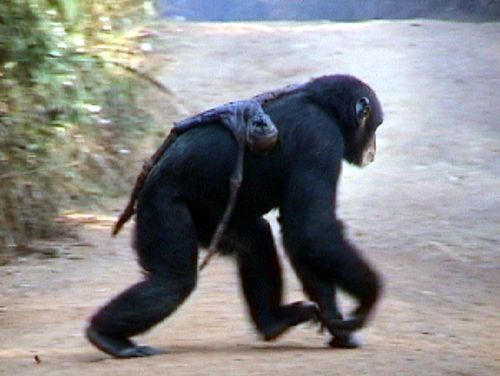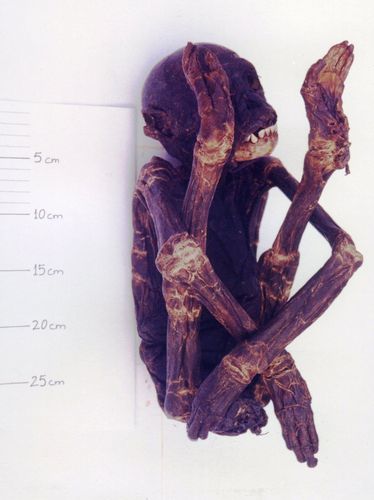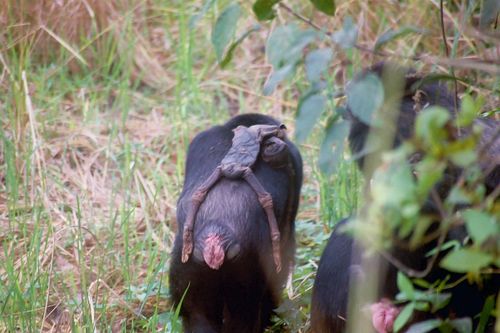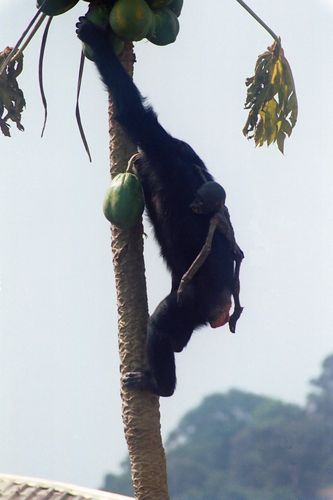
The chimpanzees continue to provide care for their deceased infants. (Credit: Oxford University, Dora Biro)
Recently at Discovery News we told you how chimpanzees confront death. They do so in ways that are very similar to our behavior toward dying friends and relatives.
On the surface, it might at first seem that chimpanzee mothers break from those noted similarities. When their offspring die as infants, the mothers will continue to carry and groom the dead bodies until the mothers are able to gradually let go of them. By that time, the infant’s body has usually mummified.
The behavior likely mirrors, at least to some extent, the biophysical reaction of human mothers when they too lose young sons or daughters. Right after birth, the mother’s body is hormonally, and in many other ways, ready to care for the infant. Even after a baby dies, the physical connection can take time to adjust. This isn’t even taking into account the emotional bond.
Chimpanzees go through this adjustment period in a very literal way, by continuing to provide care for their deceased infants.

Chimpanzee infant's mummified body shortly after it was released by its mother (Credit: Tatyana Humle)
I recently interviewed University of Oxford zoologist Dora Biro, who witnessed the chimpanzee behavior in the forests surrounding Bossou, Guinea. We often cannot include all of this information in our stories and video segments, so I’d like to share her comments with you now.
JV: Is it possible that the mothers did not fully understand their offspring were dead?
Biro: Yes – this is one of the key questions that our observations raise, I think. It’s probably fair to say that it’s very difficult to make a claim either way (ie. clearly for or clearly against their understanding that the infants were dead). As observers in the field, we only have access to behavior, not to internal mental states – which makes it very difficult to speculate on the real extent of the chimp’s understanding. They did certainly seem to understand that the infants were immobile and unable to cling by themselves (clinging is something that all chimp infants, even newborns, are very good at – the mother usually does not have to support them at all during travel) – this is why they had to come up with special ways of carrying the bodies that we don’t see with normal live infants (although as the Current Biology paper mentions, mothers of disabled infants also adjust their way of carrying to accommodate the needs of the infant). But as for whether they understood from the start that this meant that the infants were dead, that they would never come back to life again – or whether they gradually, with time, came to understand it – or even whether they never fully understood… is extremely hard to say.
JV: Although the letting go period was gradual, was there a point, do you think, where the mothers did clearly realize that their infants had died? If so, when did that happen?
Biro: No, I don’t think we can clearly pinpoint such a time. Having said that, we did not actually observe the exact moment of death in the case of either infant, so do not know how the mothers reacted at the time (and it’s possible that we would have seen some specific reaction, perhaps distress, anger, or fear, that would have indicated that they grasped, at that point, the transition between life and death).

Chimpanzees go through this adjustment period in a very literal way, by continuing to provide care for their deceased infants. (Credit: Tatyana Humle)
JV: It’s interesting that the infant “bodies’ intense smell and highly unusual appearance” didn’t repel the other chimps. If a healthy chimp smells or looks abnormal, due to an accident, illness or something else, do the chimps usually still accept that individual, if he or she was formerly in their troop? It sounds like mothers will accept handicapped infants, but I’m wondering about behavior towards previously healthy individuals who have changed. Among my cats, for example, if one has a surgical procedure and smells like medicine, the other cats will become aggressive and then stay far away.
Biro: Interesting question. I think in the case of your cats, the very “unnatural” (for them maybe “human”) smell of the medicine may be what scares them off. Among wild chimps, injuries and illnesses are quite common (unlike a surgical procedure in cats) so they will encounter such individuals often, and these individuals do not get ostracized. For example, we’ve seen a young chimp cradling his injured, bleeding finger – in that case too, the responses of other group members basically amounted to curiosity rather than any form of aggression or avoidance.
JV: How do you think this chimp behavior mirrors human behavior towards deceased infants?
Biro: This is a really hard (and sensitive) question. Certainly in humans the loss of loved ones is an immensely painful experience, and the loss of a child perhaps almost inconceivably so. (This is why i am slightly wary of direct comparisons). We can likely assume an emotional response in the chimpanzee mothers too as a result of the loss of their infants, but obviously the carrying of the infants’ remains is not something that happens in humans. At the same time, we probably experience feelings of a “refusal to let go” even if we don’t act on it in the same way as these mothers did. And yet, we might hold on to objects that remind us of the deceased person instead – we feel simply unable to throw them away, often for long periods after death – and these can be extremely emotive for us.
Another important point, important comparison, is perhaps in terms of the extremely strong mother-infant bond that exists in chimpanzees. Chimp newborns, much like humans, are completely helpless, and need full-time care from the mother. This is why chimp mothers (and humans too) have been shaped by natural selection to be very protective of their infants – to look after them, defend them, feed them, protect them at all times. The prolonged carrying may then be a by-product of this extremely strong bond – the same force that keeps the mother looking after the infant while it is alive can persist even beyond the infant’s lifetime.

Chimpanzee mother climbs a tree for food, with her mummified infant's body still in tow (Credit: Tatyana Humle)
JV: How might studies such as yours shed light on human behavior and attitudes toward death?
Biro: This is also an interesting question, and of course there are good evolutionary reasons why – if we want to understand the evolutionary origins of our own perception of death – we need to look first to our closest relatives.
JV: What else would you like our readers to know about your recent findings?
Biro: Perhaps something about conservation – the community we studied is extremely small, but it is one of the longest-running chimpanzee field sites in Africa, and has over the years contributed with a lot of interesting observations to our knowledge of wild chimpanzee behavior. Such communities are therefore extremely precious. The disease that killed these infants (as well as three other community members – in total, over a quarter of this small population) possibly originated in humans, and had a huge impact on the group in terms of its numbers and future survival.
Analysis by Jennifer Viegas
Tue Apr 27, 2010 10:49 AM ET
[source: http://news.discovery.com/animals/chimpanzee-mothers-carry-their-mummified-dead-infants.html]
